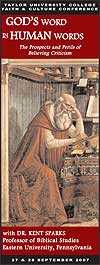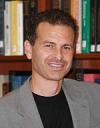 Tomorrow evening I will be picking up Dr. Kenton Sparks at the airport. He is the speaker for Taylor University College’s “Faith & Culture Conference” which runs Thursday and Friday of this week. The title of this year’s conference is “God’s Word in Human Words: The Prospects and Perils of Believing Criticism.”
Tomorrow evening I will be picking up Dr. Kenton Sparks at the airport. He is the speaker for Taylor University College’s “Faith & Culture Conference” which runs Thursday and Friday of this week. The title of this year’s conference is “God’s Word in Human Words: The Prospects and Perils of Believing Criticism.”
Here is a rundown of the different sessions:
- Session 1: “To Err is Human: A Biblical View of Epistemology” (Thursday 27 September; 11:30 am)
Evangelical Christians often believe that error is a bad thing, but the biblical view of things is otherwise. Scripture teaches that human error is an inevitable and natural part of normal, healthy living. This observation has profound implications for our epistemology and theology. - Session 2: God’s Word in Human Words: The Problem and Promise of Modern Biblical Criticism? (Thursday 27 September; 1:15 pm)
Modern biblical scholars have highlighted features in Scripture that seem incommensurate with the Bible’s divine origins. However, when we understand these features as an affirmation of our humanity and as an expression of theological orthodoxy, we shall find they are wholly suited to a high view of Scripture’s inspiration and authority. - Session 3: God’s Astronomy: Accommodation, Inspiration, and the Bible? (Thursday 27 September; 7:30 pm)
Does the Bible get the science right? And if not, what does this mean for Scripture’s authority and inspiration? The Church has long had the theological resources to deal with the apparent difficulty created by conflicts between the Bible and science. Evangelicals have largely forgotten these resources, which we shall try to recover. - Session 4: The Path of Wisdom: The Church and Biblical Criticism? (Friday 28 September; 11:10 am )
The biblical critics are right about many things, but this does not mean that we can carelessly bring their insights into church pulpits and Sunday School classrooms. “True facts,” when misunderstood, become false and potentially destructive facts. How can the Church wisely assimilate the insights of biblical criticism without being destroyed by them?
I am looking forward to these sessions as his talks will be dealing with a number of crucial topics for those of us who consider ourselves “evangelical” biblical scholars. It seems to me that evangelical biblical scholars get a raw deal from both sides of the spectrum. On the one side, scholars such as N.P. Lemche argue (somewhat recklessly) that the label “evangelical biblical scholar” is an oxymoron. You can’t be both an evangelical and a scholar at the same time — at least not a real scholar. Then, on the other side, the more conservative elements of evangelicalism question the evangelicalism of those biblical scholars who don’t hold to the traditional party line on questions such as the authorship of the Pentateuch, the unity of Isaiah, historicity of Jonah, among other questions. While I believe the situation is much better now than in the past (due in large part to the fact that evangelical scholarship has improved immensely in the last 40 years or so), Mark Noll’s comment that “The scandal of the evangelical mind is that there is not much of an evangelical mind” remains valid in many quarters of evangelicalism.
 What Kent will be drawing our attention to the human side of Scripture. And he is well-equipped to do such a task. He holds the PhD from the University of North Carolina-Chapel Hill, where he specialized in the study of the Hebrew Bible and the Ancient Near East (his adviser was John Van Seters). His publications include numerous articles on the Hebrew Bible and New Testament, as well as four books:
What Kent will be drawing our attention to the human side of Scripture. And he is well-equipped to do such a task. He holds the PhD from the University of North Carolina-Chapel Hill, where he specialized in the study of the Hebrew Bible and the Ancient Near East (his adviser was John Van Seters). His publications include numerous articles on the Hebrew Bible and New Testament, as well as four books:
- God’s Word in Human Words: An Evangelical Appropriation of Critical Biblical Scholarship (Baker Academic, forthcoming March 2008; pre-order from Amazon.ca or Amazon.com)
- Ancient Texts for the Study of the Hebrew Bible: A Guide to the Background Literature (Hendrickson, 2005; buy from Amazon.ca or Amazon.com)
- Ethnicity and Identity in Ancient Israel: Prolegomena to the Study of Ethnic Sentiments and their Expression in the Hebrew Bible (Eisenbrauns, 1998; buy from Amazon.ca or Amazon.com)
- The Pentateuch: An Annotated Bibliography (IBR Bibliographies, no. 1; Baker Academic, 2002; buy from Amazon.ca or Amazon.com)
 Kent’s Ancient Texts for the Study of the Hebrew Bible is one of the best and most recent guides to all of the background literature to the Old Testament. It includes an introduction to comparative study of ANE texts and ANE archives and libraries, as well as a discussion of all of the relevant texts organized by genre. Original publication data and other useful bibliography is included for each ancient text — I highly recommend it. At present, Kent is preparing a book-length treatment of Israelite origins for Oxford University Press.
Kent’s Ancient Texts for the Study of the Hebrew Bible is one of the best and most recent guides to all of the background literature to the Old Testament. It includes an introduction to comparative study of ANE texts and ANE archives and libraries, as well as a discussion of all of the relevant texts organized by genre. Original publication data and other useful bibliography is included for each ancient text — I highly recommend it. At present, Kent is preparing a book-length treatment of Israelite origins for Oxford University Press.
In addition to his academic credentials, Sparks is also an ordained Baptist Pastor, who served in that pastoral role for seven years before moving to Eastern University in St. Davids, PA, where he is presently a Professor of Biblical Studies. Sparks is also a recipient of the Lindback Foundation Award for Excellence in Teaching.
If you are in the Edmonton area, you are welcome to attend the sessions — especially the Thursday evening public lecture. Recordings of the talks will be made available on-line, so stay tuned.
